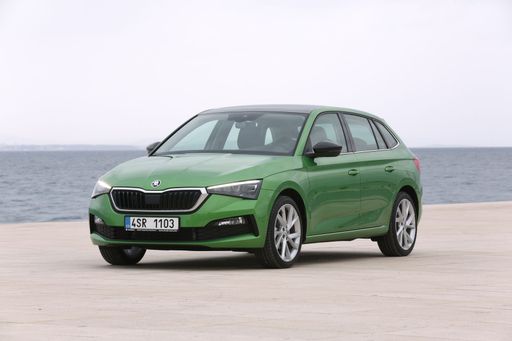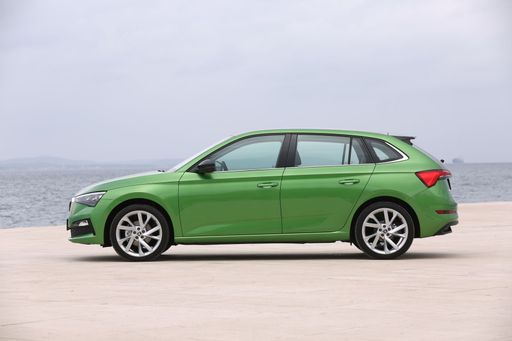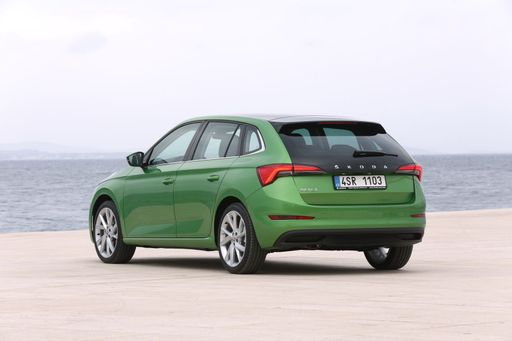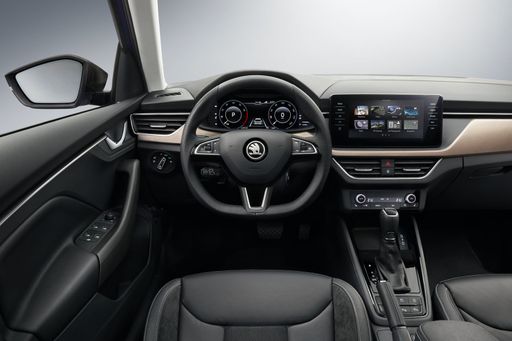Skoda Scala vs Toyota C-HR - Differences and prices compared
Compare performance (150 HP vs 223 HP), boot space and price (20900 £ vs 29100 £) at a glance. Find out which car is the better choice for you – Skoda Scala or Toyota C-HR?
Costs and Efficiency:
When it comes to price and running costs, the biggest differences usually appear. This is often where you see which car fits your budget better in the long run.
Skoda Scala has a evident advantage in terms of price – it starts at 20900 £, while the Toyota C-HR costs 29100 £. That’s a price difference of around 8229 £.
Fuel consumption also shows a difference: Toyota C-HR manages with 0.80 L and is therefore significantly more efficient than the Skoda Scala with 5 L. The difference is about 4.20 L per 100 km.
Engine and Performance:
Under the bonnet, it becomes clear which model is tuned for sportiness and which one takes the lead when you hit the accelerator.
When it comes to engine power, the Toyota C-HR has a evident edge – offering 223 HP compared to 150 HP. That’s roughly 73 HP more horsepower.
In acceleration from 0 to 100 km/h, the Toyota C-HR is slightly quicker – completing the sprint in 7.40 s, while the Skoda Scala takes 8.20 s. That’s about 0.80 s faster.
In terms of top speed, the Skoda Scala performs to a small extent better – reaching 221 km/h, while the Toyota C-HR tops out at 180 km/h. The difference is around 41 km/h.
Space and Everyday Use:
Beyond pure performance, interior space and usability matter most in daily life. This is where you see which car is more practical and versatile.
Both vehicles offer seating for 5 people.
In curb weight, Skoda Scala is clearly perceptible lighter – 1199 kg compared to 1505 kg. The difference is around 306 kg.
In terms of boot space, the Skoda Scala offers hardly perceptible more room – 467 L compared to 447 L. That’s a difference of about 20 L.
In maximum load capacity, the Skoda Scala performs slightly better – up to 1410 L, which is about 255 L more than the Toyota C-HR.
When it comes to payload, Skoda Scala minimal takes the win – 431 kg compared to 425 kg. That’s a difference of about 6 kg.
Who wins the race?
The Toyota C-HR proves to be wins the duel decisively and therefore becomes our DriveDuel Champion!
Toyota C-HR is the better all-rounder in this comparison.

Toyota C-HR
Costs and Consumption
View detailed analysis
Engine and Performance
View detailed analysis
Dimensions and Body
View detailed analysis
Skoda Scala
The Skoda Scala is a tidy, no-nonsense hatch that wraps clever packaging and composed manners into a compact, grown-up package. It’s the sensible choice for buyers who want everyday practicality with a dash of style and personality—no drama, just reliable charm.
details



Toyota C-HR
The Toyota C-HR cuts a striking figure with its angular styling and coupe-like profile, so you’ll never go unnoticed in the supermarket car park. It balances everyday practicality with a nimble, city-friendly personality, making routine commutes feel a touch more fun without asking for forgiveness.
details




Costs and Consumption |
|
|---|---|
|
Price
20900 - 30700 £
|
Price
29100 - 42800 £
|
|
Consumption L/100km
5 - 5.6 L
|
Consumption L/100km
0.8 - 5.1 L
|
|
Consumption kWh/100km
-
|
Consumption kWh/100km
-
|
|
Electric Range
-
|
Electric Range
68 km
|
|
Battery Capacity
-
|
Battery Capacity
-
|
|
co2
114 - 126 g/km
|
co2
17 - 115 g/km
|
|
Fuel tank capacity
50 L
|
Fuel tank capacity
43 L
|
Dimensions and Body |
|
|---|---|
|
Body Type
Hatchback
|
Body Type
SUV
|
|
Seats
5
|
Seats
5
|
|
Doors
5
|
Doors
5
|
|
Curb weight
1199 - 1271 kg
|
Curb weight
1505 - 1755 kg
|
|
Trunk capacity
467 L
|
Trunk capacity
350 - 447 L
|
|
Length
4362 mm
|
Length
4362 mm
|
|
Width
1793 mm
|
Width
1832 mm
|
|
Height
1514 mm
|
Height
1558 - 1564 mm
|
|
Max trunk capacity
1410 L
|
Max trunk capacity
1076 - 1155 L
|
|
Payload
403 - 431 kg
|
Payload
375 - 425 kg
|
Engine and Performance |
|
|---|---|
|
Engine Type
Petrol
|
Engine Type
Full Hybrid, Plugin Hybrid
|
|
Transmission
Manuel, Automatic
|
Transmission
Automatic
|
|
Transmission Detail
Manual Gearbox, Dual-Clutch Automatic
|
Transmission Detail
CVT
|
|
Drive Type
Front-Wheel Drive
|
Drive Type
Front-Wheel Drive, All-Wheel Drive
|
|
Power HP
95 - 150 HP
|
Power HP
140 - 223 HP
|
|
Acceleration 0-100km/h
8.2 - 10.8 s
|
Acceleration 0-100km/h
7.4 - 9.9 s
|
|
Max Speed
192 - 221 km/h
|
Max Speed
175 - 180 km/h
|
|
Torque
175 - 250 Nm
|
Torque
-
|
|
Number of Cylinders
3 - 4
|
Number of Cylinders
4
|
|
Power kW
70 - 110 kW
|
Power kW
103 - 164 kW
|
|
Engine capacity
999 - 1498 cm3
|
Engine capacity
1798 - 1987 cm3
|
General |
|
|---|---|
|
Model Year
2025
|
Model Year
2024 - 2025
|
|
CO2 Efficiency Class
C, D
|
CO2 Efficiency Class
C, B
|
|
Brand
Skoda
|
Brand
Toyota
|
Is the Skoda Scala offered with different drivetrains?
The Skoda Scala is available as Front-Wheel Drive.
The prices and data displayed are estimates based on German list prices and may vary by country. This information is not legally binding.




